We use cookies on this site to enhance your experience.
By selecting “Accept” and continuing to use this website, you consent to the use of cookies.
Search for academic programs, residence, tours and events and more.
Laurier faculty members help shape the future of Indigenous education.
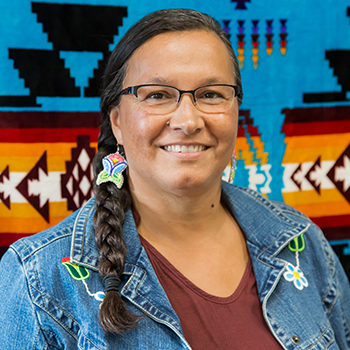 Associate Professor Kathy Absolon's area's of academic expertise include Indigenous history, holistic teaching, learning and social work practice, as well as decolonization and indigenization. Anishinaabekwe from Flying Post First Nation, Absolon-King earned her master of social work from Laurier in 1991 and PhD from the University of Toronto in 2008.
Associate Professor Kathy Absolon's area's of academic expertise include Indigenous history, holistic teaching, learning and social work practice, as well as decolonization and indigenization. Anishinaabekwe from Flying Post First Nation, Absolon-King earned her master of social work from Laurier in 1991 and PhD from the University of Toronto in 2008.
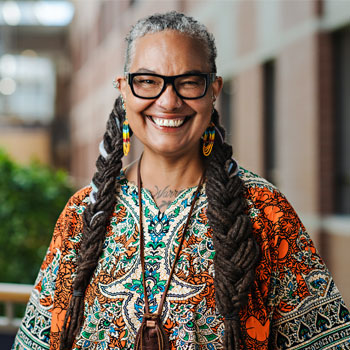 Ann Marie Beals is an assistant professor in Community Psychology, in the Psychology Department at Wilfrid Laurier University, Waterloo Campus, Ontario. Beals is currently finishing their PhD in Community Psychology, where they also received their master’s degree in Community Psychology in 2018. Beals' undergraduate university is Mount Saint Vincent in Halifax Nova Scotia, where, in 2016, they received an honours degree, BA in Psychology. Beals also attended the Nova Scotia Community College, where they received an honours diploma in Child & Youth Care, October 2010.
Ann Marie Beals is an assistant professor in Community Psychology, in the Psychology Department at Wilfrid Laurier University, Waterloo Campus, Ontario. Beals is currently finishing their PhD in Community Psychology, where they also received their master’s degree in Community Psychology in 2018. Beals' undergraduate university is Mount Saint Vincent in Halifax Nova Scotia, where, in 2016, they received an honours degree, BA in Psychology. Beals also attended the Nova Scotia Community College, where they received an honours diploma in Child & Youth Care, October 2010.
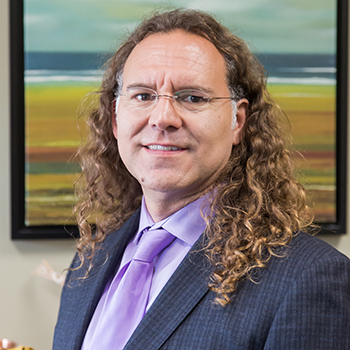 Associate Professor Gus Hill earned his PhD in social work from Laurier in 2008 and today teaches in the Master of Social Work Indigenous Field of Study program. Anishnaabe from the Sault Ste. Marie area of Ontario, Hill's background includes work in child welfare, mental health, addictions treatment, corrections and private counselling. He brings an Indigenous-focused, critical perspective to his teaching and research, which focuses on improving the well-being of Indigenous Canadians.
Associate Professor Gus Hill earned his PhD in social work from Laurier in 2008 and today teaches in the Master of Social Work Indigenous Field of Study program. Anishnaabe from the Sault Ste. Marie area of Ontario, Hill's background includes work in child welfare, mental health, addictions treatment, corrections and private counselling. He brings an Indigenous-focused, critical perspective to his teaching and research, which focuses on improving the well-being of Indigenous Canadians.
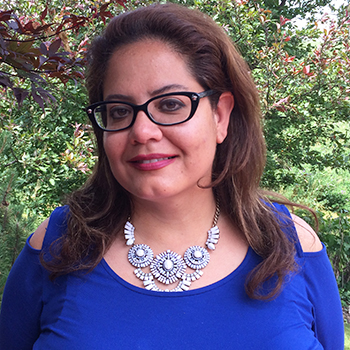 An assistant professor in Laurier's Master of Social Work Indigenous Field of Study program, Lori Hill is Mohawk, Turtle Clan, from Six Nations of the Grand River Territory. Along with teaching, Hill provides counselling in the Six Nations community and centres her helping in an Indigenous, holistic worldview.
An assistant professor in Laurier's Master of Social Work Indigenous Field of Study program, Lori Hill is Mohawk, Turtle Clan, from Six Nations of the Grand River Territory. Along with teaching, Hill provides counselling in the Six Nations community and centres her helping in an Indigenous, holistic worldview.
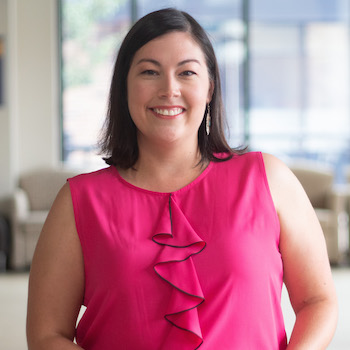 Lianne C. Leddy is a citizen of the Serpent River First Nation and an associate professor of History in the Faculty of Arts. Leddy completed her undergraduate degree in History and English at Laurier in 2005, earned her master's degree in history from Western University in 2006 and her PhD at Laurier in 2011. Leddy's research focuses on environmental and gender issues in Indigenous history in Canada.
Lianne C. Leddy is a citizen of the Serpent River First Nation and an associate professor of History in the Faculty of Arts. Leddy completed her undergraduate degree in History and English at Laurier in 2005, earned her master's degree in history from Western University in 2006 and her PhD at Laurier in 2011. Leddy's research focuses on environmental and gender issues in Indigenous history in Canada.
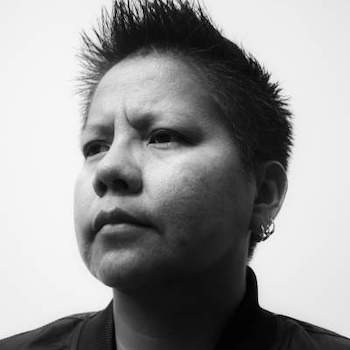 An associate professor in the Department of Indigenous Studies, Law & Social Justice, Percy Lezard is a Sqilxw, 2Spirit, non-binary person with multiple disabilities. Their work prioritizes clear, tangible outcomes for marginalized people and priority populations. They bring grounded experience and knowledge of Indigenous teaching pedagogies and methodologies, as well as student mentorship and student success program development with a focus on enhancing Indigenous brilliance. Their background includes over thirty-five+ years of field experience as an activist, community organizer and Indigenous helper. Lezard's focus is on ensuring the reciprocal relationship culture is fostered and supported within higher education spaces.
An associate professor in the Department of Indigenous Studies, Law & Social Justice, Percy Lezard is a Sqilxw, 2Spirit, non-binary person with multiple disabilities. Their work prioritizes clear, tangible outcomes for marginalized people and priority populations. They bring grounded experience and knowledge of Indigenous teaching pedagogies and methodologies, as well as student mentorship and student success program development with a focus on enhancing Indigenous brilliance. Their background includes over thirty-five+ years of field experience as an activist, community organizer and Indigenous helper. Lezard's focus is on ensuring the reciprocal relationship culture is fostered and supported within higher education spaces.
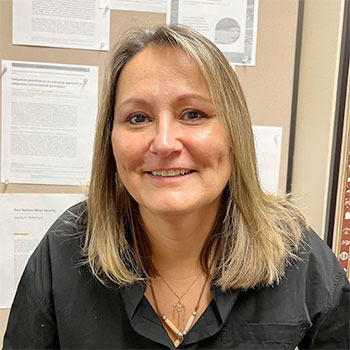 Sheri Longboat (she/her) is an associate professor in the Department of Geography and Environmental Studies, Faculty of Science. She is a mixed Mohawk Ukrainian and member of the Six Nations of the Grand River with over 25 years experience working with and within First Nations communities in lands and resources, education and training, and research and capacity-building. Her interdisciplinary teaching and research focus on water planning, management, and governance in the context of security, sustainability, self-determination, and change. She is a Laurier Geography graduate, PhD (2013) and MA (1996,) and holds a BEd from Brock University (1996) and honours BES from the University of Waterloo (1992). Prior to joining Laurier in 2024, she was an associate professor in Rural Planning and Development, School of Environmental Design and Rural Development at the University of Guelph.
Sheri Longboat (she/her) is an associate professor in the Department of Geography and Environmental Studies, Faculty of Science. She is a mixed Mohawk Ukrainian and member of the Six Nations of the Grand River with over 25 years experience working with and within First Nations communities in lands and resources, education and training, and research and capacity-building. Her interdisciplinary teaching and research focus on water planning, management, and governance in the context of security, sustainability, self-determination, and change. She is a Laurier Geography graduate, PhD (2013) and MA (1996,) and holds a BEd from Brock University (1996) and honours BES from the University of Waterloo (1992). Prior to joining Laurier in 2024, she was an associate professor in Rural Planning and Development, School of Environmental Design and Rural Development at the University of Guelph.
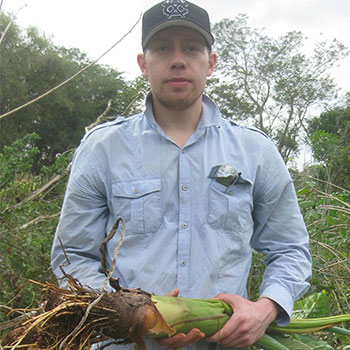 An assistant professor in Laurier's Department of Geography and Environmental Studies, Miguel Sioui sees himself as a cultural translator between two worlds – Western and Indigenous – that have historically struggled to share meaningful communication. Sioui's current research aims to bridge Indigenous and Western academic epistemologies. He hopes this effort will help Canada and the world deal more effectively with increasingly complex local, regional and global environmental challenges. Sioui's areas of expertise include Indigenous knowledge, Indigenous land use, environmental ethics and environmental management.
An assistant professor in Laurier's Department of Geography and Environmental Studies, Miguel Sioui sees himself as a cultural translator between two worlds – Western and Indigenous – that have historically struggled to share meaningful communication. Sioui's current research aims to bridge Indigenous and Western academic epistemologies. He hopes this effort will help Canada and the world deal more effectively with increasingly complex local, regional and global environmental challenges. Sioui's areas of expertise include Indigenous knowledge, Indigenous land use, environmental ethics and environmental management.
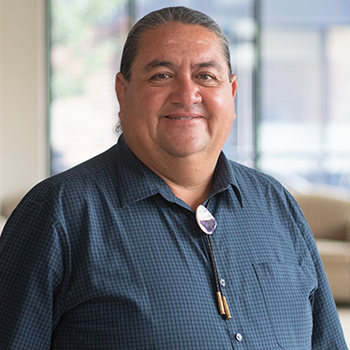 A lecturer in Laurier's Indigenous Studies program, Darren Thomas' research focuses on the health and well-being of North American Indigenous populations, with a special focus on Indigenous rights and resource governance, self-determination and research methodologies. Thomas, who is Seneca from Six Nations of the Grand River Territory, is also part of an international team of scholars and activists documenting the implementation of "free, prior and informed consent" outlined in the United Nations Declaration on the Rights of Indigenous Peoples.
A lecturer in Laurier's Indigenous Studies program, Darren Thomas' research focuses on the health and well-being of North American Indigenous populations, with a special focus on Indigenous rights and resource governance, self-determination and research methodologies. Thomas, who is Seneca from Six Nations of the Grand River Territory, is also part of an international team of scholars and activists documenting the implementation of "free, prior and informed consent" outlined in the United Nations Declaration on the Rights of Indigenous Peoples.
Contact Us: